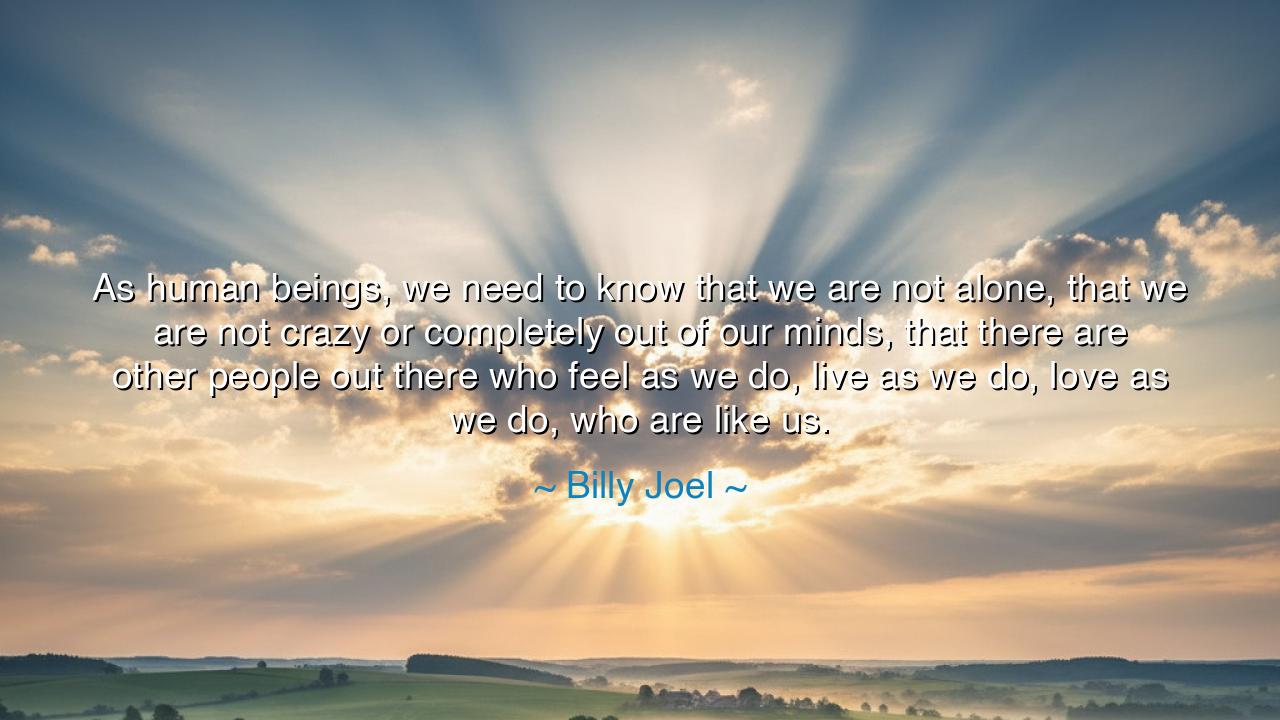
As human beings, we need to know that we are not alone, that we
As human beings, we need to know that we are not alone, that we are not crazy or completely out of our minds, that there are other people out there who feel as we do, live as we do, love as we do, who are like us.






"As human beings, we need to know that we are not alone, that we are not crazy or completely out of our minds, that there are other people out there who feel as we do, live as we do, love as we do, who are like us." These words by Billy Joel resonate deeply with the fundamental human need for connection and belonging. Joel speaks to a truth that stretches back through the ages—that in moments of isolation, fear, or confusion, what we seek most is the assurance that we are not alone in our struggles, our dreams, or our emotions. To know that others share in our human experience, that they feel what we feel, is one of the most comforting and empowering realizations we can have. It reminds us that our emotions, whether they be of joy or sorrow, are part of a shared experience, and in this connection, we find strength and solace.
In the ancient world, the Greek philosophers often wrestled with the nature of human connection. Socrates, for example, in his dialogues, sought to engage others in conversation not merely to share knowledge but to find that deeper bond of understanding that comes from the exchange of ideas and emotions. The Stoics, such as Marcus Aurelius, also spoke of universal brotherhood, understanding that all human beings are interconnected through the shared experience of being human. For them, the idea of isolation—the notion that one might be truly alone in their thoughts or feelings—was both alien and untrue. Socrates’ insistence on dialogue and debate, even in the face of possible persecution, was his way of showing that through human connection, we overcome the loneliness that can arise from individual thought and experience.
Consider the life of Aristotle, whose works were a deep reflection on human nature and society. Aristotle believed that to be fully human was to be social; humans, by nature, are meant to live within a community, to share their thoughts, their joys, and their pains. His idea of the "good life" was one lived in companionship and mutual understanding—a life where one's thoughts and actions were shaped by the influence of others who were walking the same path of human existence. His teachings remind us that the human experience is inherently a shared one, and that to be truly human is to seek understanding in others who, like us, feel, dream, and struggle.
The desire to connect with others, to know that we are not alone in our journey, can be seen in the life of Anne Frank. During the harrowing days of her hidden life in Nazi-occupied Amsterdam, Anne wrote in her diary about the profound isolation she felt, but also about her deep desire to feel understood. Despite the confines of her attic hiding place, she poured her heart out, sharing her most intimate fears, desires, and hopes, knowing in her soul that somewhere, someday, someone would read her words and understand her. Her words have since touched millions, proving that even in the darkest hours of human existence, the need for connection and understanding persists. Anne’s legacy is one of shared humanity, a reminder that we are never truly alone in what we experience.
Similarly, in the life of Mahatma Gandhi, we see a leader who sought not only political independence for his country but emotional and spiritual connection for his people. Gandhi’s deeply humanistic philosophy was rooted in the belief that every individual is connected to the other through a shared moral responsibility and a shared human spirit. He knew that in the fight for freedom, it was not only the physical chains of colonialism that needed to be broken, but the emotional and spiritual bonds of solidarity that held the oppressed together. Gandhi’s words, and his example, show us that the human experience is richer when it is shared, and that freedom is not just an external state, but an internal connection to others who walk with us on this journey of life.
The lesson in Billy Joel's quote is deeply emotional, yet profoundly simple. Loneliness is not merely the absence of others; it is the perception that we are the only ones to feel a certain way, to face a particular struggle, or to endure a unique pain. To know that we are not alone, that others share in our human experience, is one of the greatest comforts we can find. Empathy, the ability to understand and share the feelings of others, is the very foundation of connection. It allows us to realize that the trials we face are not exclusive to us, but are part of a much larger, shared human condition. By embracing this truth, we allow ourselves to be vulnerable, to open our hearts to others, and to find strength in that connection.
In our own lives, we should seek out these connections—with family, friends, and even with strangers who share our experiences and our struggles. Listening to others, sharing our own stories, and seeking understanding in the world around us are ways to bridge the isolation that often feels so overwhelming. We must remember that we are not alone in our joys or sorrows, and that empathy is the key to finding meaning in our shared experiences. Let us also strive to offer others the same comfort we seek, reaching out with kindness, understanding, and love to those who might be feeling the same sense of isolation. By doing so, we create a world where connection, shared humanity, and love become the greatest forces that bind us together.






AAdministratorAdministrator
Welcome, honored guests. Please leave a comment, we will respond soon